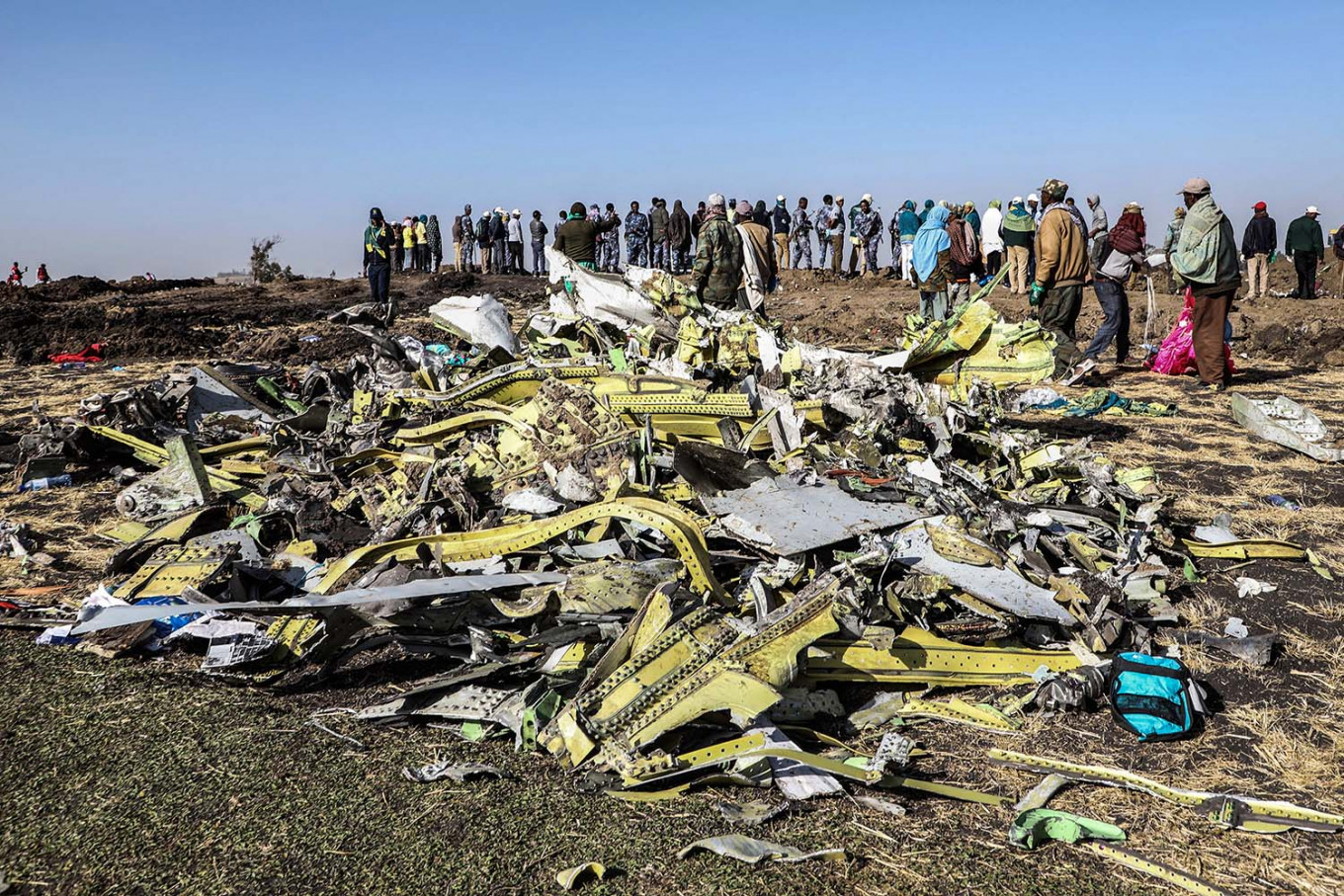Popular Reads
Top Results
Can't find what you're looking for?
View all search resultsPopular Reads
Top Results
Can't find what you're looking for?
View all search resultsNew crash calls for closure
Change text size
Gift Premium Articles
to Anyone
 People stand near collected debris at the crash site of Ethiopia Airlines near Bishoftu, a town some 60 kilometres southeast of Addis Ababa, Ethiopia, on March 11, 2019. - An Ethiopian Airlines Boeing 737 crashed on March 10 morning en route from Addis Ababa to Nairobi with 149 passengers and eight crew believed to be on board, Ethiopian Airlines said. (AFP/Michael Tewelde)
People stand near collected debris at the crash site of Ethiopia Airlines near Bishoftu, a town some 60 kilometres southeast of Addis Ababa, Ethiopia, on March 11, 2019. - An Ethiopian Airlines Boeing 737 crashed on March 10 morning en route from Addis Ababa to Nairobi with 149 passengers and eight crew believed to be on board, Ethiopian Airlines said. (AFP/Michael Tewelde)
T
he Indonesian civil aviation regulator has taken the precaution of grounding some Boeing 737 aircraft following Sunday’s deadly crash of an Ethiopian Airlines 737 MAX 8 just outside Addis Ababa, killing all 157 passengers and crew on board — including an Indonesian.
Flight ET302 was the second 737 MAX 8 to crash in the past six months after Indonesian low-cost carrier Lion Air’s flight JT610 plunged into the Java Sea killing all 189 passengers and crew on board.
The government’s decision to ground all 737 MAX 8s, of which 10 are operated by Lion and one by flag carrier Garuda Indonesia, should be welcomed amid efforts to get to the root of the situation.
While there have been no final findings on flight JT610, there are disturbing similarities with flight ET302 and grounding the aircraft is part of the government’s determination to guarantee the safety of passengers and the public in general.
Pilots from both flights reported difficulties in controlling the aircraft just minutes after take-off, involving steep dives and nose-ups.The pilots also requested a return-to-base but crashed before they made it back to the tarmac.
Following the JT610 crash in October 2018, Boeing revealed it had included a new system on the 737 MAX 8, the latest iteration of the highest-selling commercial jetliner in history.
The new feature, the Maneuvering Characteristics Augmentation System (MCAS), functions as an anti-stall system when the aircraft’s onboard computer senses the plane is climbing too steeply by lowering the nose, a situation known as “runaway stabilizer”.
Boeing’s manual for the 737 MAX 8, however, did not mention the MCAS, as reported by pilots in the United States who had undergone training in their transition from the earlier 737 Next Generation models to the MAX models. The pilots said they had not been informed of the new safety feature.
Following initial investigations into the JT610 crash, the US Federal Aviation Administration (FAA) issued an emergency airworthiness directive to overcome the “runaway stabilizer” situation.
Whether the MCAS is indeed the culprit in both flights remains to be confirmed by flight safety investigators. But two crashes in six months for a new aircraft is too alarming.
The Transportation Ministry’s Directorate General of Air Transportation grounded 737 MAX 8s after authorities in Ethiopia, the Cayman Islands, China and Mongolia grounded the aircraft type, and ordered a thorough inspection of the fleet.
The civil aviation regulator is also remaining in close contact with the FAA to guarantee that all 737 MAX 8s operating in Indonesia are airworthy.
The directorate general also pointed to the FAA’s emergency airworthiness directive regarding the issue.
This will allow airlines, and Boeing, to provide thorough information and possibly conversion training to pilots on how to handle MCAS, especially as Boeing insists that it had already provided instructions on how to handle flight-control behavior by, among other things, switching from electric to manual control.
While every new product has its own problems, the loss of hundreds of lives are unfathomable for such a supposedly sophisticated product.









